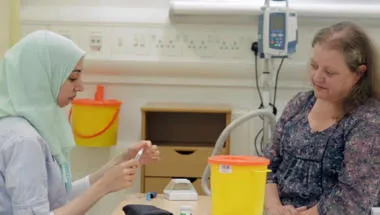
Professor Daniel Stahl
Professor in Medical Statistics and Statistical Learning
Contact details
Biography
Daniel joined the Institute of Psychiatry, Psychology, and Neuroscience (IoPPN), King’s College London in 2006, currently holding the position of Professor in Medical Statistics and Statistical Learning at the Department of Biostatistics and Health Informatics.
He holds the role of Deputy Head of the Department and Deputy Lead of the NIHR Maudsley BRC theme “Trials, Genomics and Predictions”.
Before joining the IoPPN, Daniel worked as a Statistician for the Departments of Developmental Psychology and Primatology at the Max Planck Institute for Evolutionary Anthropology in Leipzig, Germany. Prior to that, he served as a Postdoctoral Research Fellow at the School of Mathematics and Statistics, University of St. Andrews, Scotland (2000-2001) and the Institute of Insect Virology, State Research Centre for Agriculture, Neustadt/Weinstrasse, Germany (1999-2000). He also worked as a Research Scientist in Primate Husbandry at the German Primate Centre in Göttingen in the years 1996-1997.
Daniel obtained a “Diploma-Biology” degree from Eberhardt-Karls-Universität Tübingen, Germany in 1991. In 1998, in collaboration with the German Primate Centre in Göttingen and Emory University in Atlanta, he acquired a PhD in Behavioural Biology from the same university. He then went on to further his education by completing a postgraduate degree in "Biometry for Scientists" (MSc equivalent) at the Mibeg Institute in Tübingen, Germany,
In recent years, Daniel's research interest has specialized in prediction modelling, a cornerstone of 21st-century precision medicine that intersects statistics, health informatics, and clinical research. His group “Precision Medicine and Statistical Learning” is devoted to propelling precision psychiatry through the development of models for risk prediction, therapy response identification, and trials' enrichment. Key achievements include creating a transdiagnostic risk calculator for early psychosis detection and a model predicting major depression recurrence. Both these tools are under implementation and validation phases and show promise for clinical decision-making.
In 2019, Daniel founded the Maudsley BRC Prediction Modelling Group at King's College London’s IoPPN. This group enhances collaboration among researchers and clinicians, fostering communication and information exchange on precision medicine's predictive modelling applications.
His research also explores identifying predictors, mediators, and moderators of treatment success and uses model-based cluster analysis to discover subgroups among psychiatric patients. In addition, he has played a pivotal role as a Senior Trial Statistician in numerous clinical trials.
Finally, his group addresses the translational gap in prediction modelling within psychiatry. By focusing on effective communication strategies and combating bias and stigma, they aim to enhance the acceptance of predictive models among clinicians and service users.
Research Interests:
As a medical statistician with a keen interest in data science, Daniel's primary research area includes:
- Clinical Prediction Modelling and Precision Psychiatry: Leveraging predictive modelling techniques to create personalized healthcare strategies and improve patient outcomes.
- Comorbidity and Prediction Modelling: Specializing in the development of predictive models to understand and forecast comorbid conditions in patient populations.
- Statistical & Machine Learning: Utilizing advanced statistical and machine learning algorithms to analyse and interpret complex datasets.
- Model Selection: Implementing rigorous methods for the selection of statistical models to ensure the validity and reliability of the research findings.
- Mediation and Moderation: Analysing the mechanisms and contingencies in the relationships among clinical variables to understand and predict causal effects.
- Missing Data in Prediction Modelling: Developing and employing sophisticated techniques to handle missing data, ensuring the robustness of the prediction models.
- Cluster Analyses: Applying cluster analysis methods to identify, categorize, and understand patterns and relationships in datasets.
- Clinical Trials: Engaging as a Senior trial statistician in the design, implementation, and analysis of clinical trials aimed at testing new interventions and treatments
Teaching:
As a Co-Programme Lead for the "Applied Statistical Modelling & Health Informatics" MSc/PG Dip/PG Cert programs in our department, one can learn more about these programs via the following link: ASHMI
Daniel is the Module Lead for "Prediction Modelling" and offers courses on "Introduction to Path Analysis and Structural Equation Modelling." He also provides statistical support to students and researchers from the Institute of Psychiatry, Psychology, and Neuroscience.
Furthermore, he is the Lead of the UKRI and MRC-funded "Health Data Science" online learning and research environment, an integral part of KCL’s “Innovation Scholar Programme: Big Data Skills Training.”, see https://innovationscholars.er.kcl.ac.uk/training/pillar-one-health-data-science/ for details
Over the years, Daniel has taught both introductory and advanced statistics courses to MSc students at the IoPPN and those in the Doctorate of Clinical Psychology program. These courses span various topics, such as measurement scale development, prediction modelling, R programming, multiple testing and model selection, factor analyses, structural equation modelling, mediation analyses, longitudinal data analyses, and methods for handling missing values."
.
Expertise and Public Engagement:
Through his Twitter account https://twitter.com/daniel_stahl_01 , Daniel actively engages the public by sharing updates and information about prediction modelling in mental health.
Additionally, the BRC prediction modelling group page below, serves as a platform to inform the public about our research in clinical prediction modelling. Moreover, he organizes data science and prediction modelling days specifically designed for school students, aiming to inspire and educate them in these fields. https://www.maudsleybrc.nihr.ac.uk/facilities/prediction-modelling-group/
Articles and Publications
Daniel's Pure Profile : - Daniel Stahl
Publications:
- Neurocognitive measures of self-blame and risk prediction models of recurrence in major depressive disorder
- Virtual Reality Therapy for the Negative Symptoms of Schizophrenia (V-NeST): A pilot randomised feasibility trial
- Clinical prediction models in psychiatry: a systematic review of two decades of progress and challenges.
- Assessment of somatosensory function and self-harm in adolescents
- Universal and selective interventions to promote good mental health in young people: Systematic review and meta-analysis
- Developing an individualized risk calculator for psychopathology among young people victimized during childhood: A population-representative cohort study
- A framework for handling missing accelerometer outcome data in trials
- Predicting type 2 diabetes prevalence for people with severe mental illness in a multi-ethnic East London population
- Predicting onset of early- and late-treatment resistance in first-episode schizophrenia patients using advanced shrinkage statistical methods in a small sample
Research

Precision Medicine and Statistical Learning
Precision Medicine & Statistical Learning

The SOUth London Diabetes (SOUL-D) Study
SOUL-D is a prospective cohort study of the association between depression and diabetes outcomes in people with newly diagnosed type 2 diabetes.
Project status: Ongoing

Psychological interventions to improve glycaemic control in type 1 and type 2 diabetes: A systematic review and meta-analysis
A systematic review of psychological interventions in type 1 and 2 diabetes to assess whether their effectiveness in improving glycaemic levels has improved.
Project status: Completed
Research

Precision Medicine and Statistical Learning
Precision Medicine & Statistical Learning

The SOUth London Diabetes (SOUL-D) Study
SOUL-D is a prospective cohort study of the association between depression and diabetes outcomes in people with newly diagnosed type 2 diabetes.
Project status: Ongoing

Psychological interventions to improve glycaemic control in type 1 and type 2 diabetes: A systematic review and meta-analysis
A systematic review of psychological interventions in type 1 and 2 diabetes to assess whether their effectiveness in improving glycaemic levels has improved.
Project status: Completed
